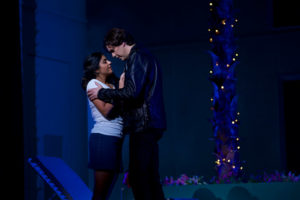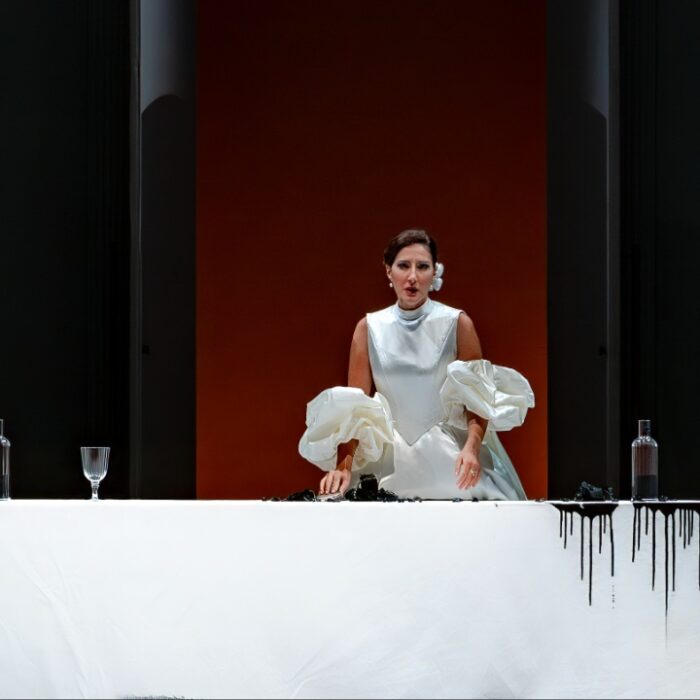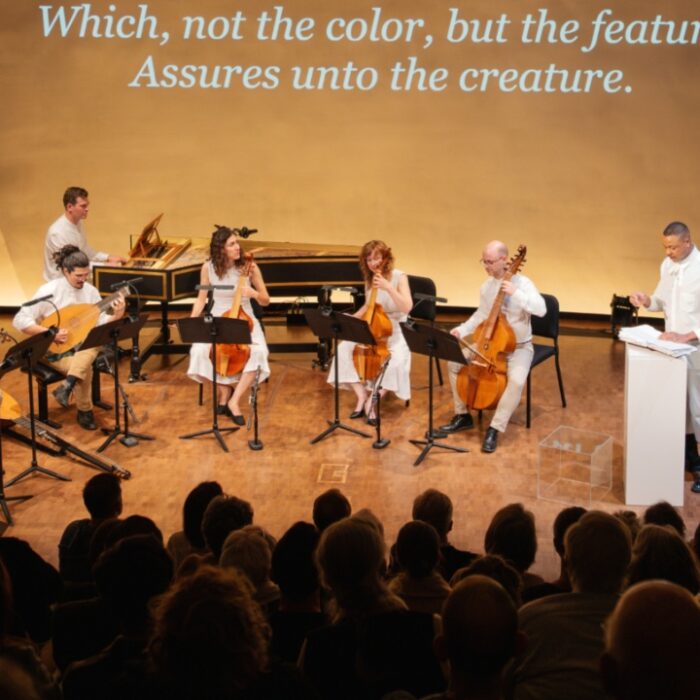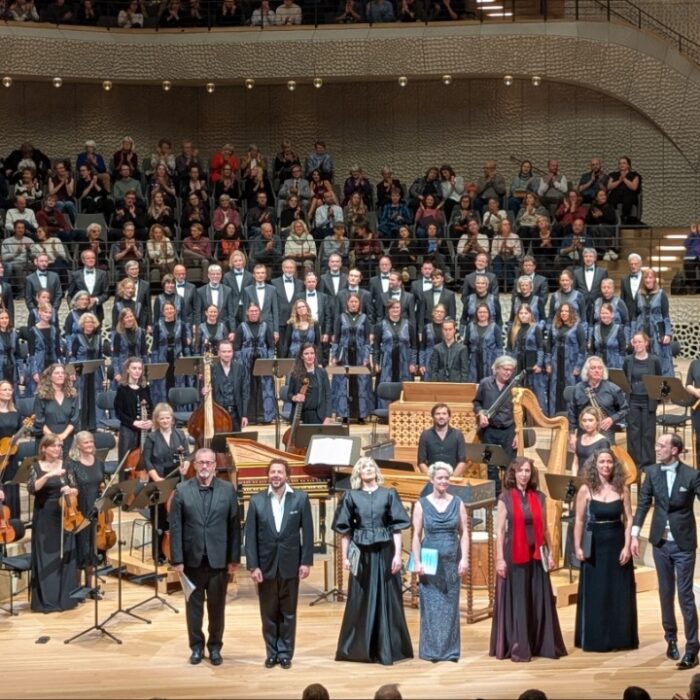
Detroit Opera 2022-23 Review: Faust
Zach Borichevsky & Amina Edris Shine in Messy Production
By John VandevertOn a cold and dark November 18th, Detroit Opera [DO] performed the penultimate opera of their 2021/2022 season: Charles Gounod’s celebrated opera Faust. An immortal tale of deception and redemption, this operatic classic promised audiences a night of heavy allegories.
Using Director Lileana Blain-Cruz’s 2019 version, originally created for Opera Omaha’s production, with movement curated by dancer and choreographer Raja Feather Kelly, DO imagined the anomic Dr. Faust as an aged tech mogul intrigued by Méphistophélès’ promise of youthfulness, vigor, and realization of Faust’s desire for the run-of-the-mill waitress Marguerite. This “updated for modern times” aesthetic was emphasized by Adam Rigg’s minimalist set designs and Yi Zhao’s vaporwave lighting effects, along with tailgate party culture, a drug-induced miscarriage, and even a Tim McGraw-styled neon-church scene.
Filling out the small but mighty cast were a handful of studious operatic performers, both seasoned and up-and-coming. Zach Borichevsky (Faust), Robert Pomakov (Méphistophélès), Babatunde Akinboboye (Valentin), Jenny Anne Flory (Siebel), and Ben Reisinger (Wagner), performed with dedication and impeccable honesty, both vocally and dramatically speaking, while their counterparts Amina Edris (Margeurite), and Victoria Livengood (Dame Marthe), invoked the whole gamut of the human condition with exceptional clarity and force.
With an untouchable orchestral force led by august conductor Valerio Galli and a chorus conscientiously rehearsed by Suzanne Mallard Acton, DO’s performance was a delightful and much-needed feast for the senses.
Staging Choices
Detroit Opera and its non-traditional interpretation of Gounod’s “Faust” was the brainchild of New York City director Lileana Blain-Cruz, although the work had been originally created for Opera Omaha’s 2019 production. Having a career filled with experimental projects like María Irene Fornés’ “Fefu and Her Friends” and even an immersive pop-infused retelling of “Salome,” the staging took on a far more theatre-focused attitude.
“Approachable” theatrics at first appeared to be the overarching M.O. for the night, but upon reading the program notes, the heavily misunderstood quality of “‘authenticity” is closer to Blain-Cruz’s rendition. The production centered its dramaturgy around a new performing edition based on the opera’s second version, the popular 1869 edition, wherein the previously “lyric theatre” opera was turned into a “grand opera” with the inclusion of a ballet number and the transformation of spoken text into recitative.
Created by the French musicologist Paul Prevost and music publisher Barenreiter-Verlag in 2018 and first premiered by the group Les Talens Lyriques, the edition does away with the more recognizable recitatives for their spoken French counterparts while also including previously excluded numbers and melodramatic moments. As DO’s Head of Music Nathalie Doucet remarks, the choice to use this version stemmed from DO’s choice to return the opera to its opera comique existence, where bouts of humor and levity counterpose heavier, more doleful and solemn subject materials.
It is worthy of mention that Gounod was highly opinionated when it came to the opera’s many aspects, holding official publication of Valentin’s popular aria “Avant de quitter ces lieux” while also desiring all the opera’s many renditions be available for performance regardless of the official version. Gounod and his librettists Jules Barbier and Michel Carre cared little for Goethe’s philosophical message in Faust; a dialectic between God and Nature as synonymous, not antagonistic forces of being. Philosopher Dr. Charles Hendel had called Goethe’s message a “both… and…” scenario; but rather than indulge in heavy debates on whether God exists in the real world via Nature, Gounod’s “Faust” was a tale of heaven against hell: the powers of divinity versus the powers of malevolence. But as the Met’s David Shengold notes, Gounod’s “Faust” is less about Dr. Faust per se and more about his exploitation of Marguerite (Goethe’s Gretchen), her innocence, and Faust’s subsequent damnation juxtaposed against Marguerite’s entrance into the Kingdom of Heaven.
In addition to this narrative recentering, DO’s production used the extra scenes of the 1869 edition to develop the characters of Valentin and Siébel, although the latter was given very little. In terms of Adam Rigg’s set design and Kaye Voyce’s costuming, what can be said? Faust’s pre-damnation attire was a robe with glasses, and once he sold his soul his lethargic costume turned into that of a wannabe greaser, while Méphistophélès’ had a dashing suit replete with a white pocket square and slicked long hair; a sardonic critique against Jesus, perhaps?
I forgot I was at an opera later on, when the chorus came barreling out of the wings dressed in orange sports shirts and armed with plastic horns and foam fingers, and commenced rampaging about thanks to solo cups and unseen alcohol. Marguerite and Dame Marthe’s costumes were effective at reflecting their low socioeconomic status. As a colleague pointed out, Marguerite’s pregnant stomach was unrealistic, but it got the point across, though her blotchy fake blood mixed with Rigg’s half-hearted minimalism left much to be desired.
Lighting effects and the incessant billows of fog proved to be Blain-Cruz’s best friend, as the aseptic “green” walls in various states of construction were nauseating yet created a dramatic juxtapositions of size, which was an effective way of heightening feelings of alienation, anomie, and internal/external identity fracture. The retro vaporwave hues of pink, red, blue, green, yellow, and orange saturated the monochromatic scenes yet were invaluable in creating an uncanny aroma of relatability which, at the end of the day, is the M.O of operatic theatre. Criticism must be directed towards the Act Three “Walpurgis Night” scene, however. Cheap plastic tinsel, lumpy pseudo-nude costumes, men and women in frizzy synthetic wigs, with a bacchanalia of questionable dancing and ensemble choreography, yet high-quality singing.
Singing And Acting
Despite the production’s shortcomings, DO’s “Faust” was brought to life by “singing actors.” The entire cast was synergetic with one-another and obviously well-practiced, in a musical communion with the orchestra. Outside of the visual oddities, musically, I was spellbound from start to finish.
Although discrepancies in spoken French diction among the principles were troubling—especially prominent in Livengood’s Americanized attempt, where it seemed that despite her experience with Francophile repertoire, shaky vibrato was the secondary leitmotif of the evening—there were many wins. Borichevsky and Edris aptly demonstrated vocal refinement and their sensitive awareness to the dramatic nuances between the damned lovers throughout the opera. Borichevsky revealed himself to be a masterful and technically competent lyric tenor with an innate cut and ring despite the role’s required forays into the dramatic territory. From the moment he began to the moment of his inevitable damnation, Faust’s corrupted goodness was invoked in Borichevsky’s consistent spinning tunefulness and equipoised registrar movements. Loosening control during moments of extreme passion and experiential climax, Borichevsky delighted and captivated the audience with his presence. Edris, an operatic bel esprit in the making, was an ebullient flourish from start to finish, despite her character’s turbulent circumstances. Edris sang with a youthful vitality laced with a sophisticated technical shrewdness indicative of her training and acquired operatic experiences. Her acting, while reserved and shy at the beginning, defrosted by Act Three, and by the final act, during her visceral “Mad Scene,” Edris’ multidimensional lamb-turned-lion interpretation had me convinced of impending greatness. Her French diction was the beau idéal, not surprising given her apparent familiarity with the Parisian operatic world.
Flory and Reisinger were splendidly earnest and gave eloquently persuasive performances which conveyed their intrepid comfortability with, and apt knowledge of, the requirements for the modern operatic climate. Despite their student beginnings—Reisinger studying at Michigan State University and Flory studying at James Madison University—their dramaturgical acumen was patently obvious. Their studious vocalisms were the causal result of years of training and laborious work. I wanted to hear Reisinger more, but I am sure it will come in due time. Akinboboye filled out the evening with sturdy vocals, though his portrayal lacked layers. There was an absence of anything more than interchangeable anger and happiness. He is a resolute baritone with a prominent timbre, and I wanted to like his voice, though it was only during his death that I started to hear dynamic contrast and shading. Akinboboye’s stoic gestures during Act Three did little to convince me of the character’s overall depth.
The added scenes did add some dimensionality, however, so in that regard, his performance excelled. Pomakov’s eccentric, ostentatious take on Méphistophélès carried homages to Opéra-Comique’s perceptive humor and boisterous nights at the Théâtre des Bouffes-Parisiens, and he sang with an erotic dignity and commensurate refinement befitting someone of his education and experience. It was concerning, however, that his voice sometimes seemed one-toned in its’ complexion and not wholly youthful in quality. Darkened tones and teetering vibrato corrupted his effective dramaturgy, while his pedanticism, especially prominent during the opening “Prologue,” although healed by the end, was a curiosity. A special mention of Detroit Opera’s Chorus is warranted, as they have been on a tough journey during DO’s change of hands. Having had few opportunities to perform in recent history—going from full seasons of five operas to what it is now—their tenacity and perseverance is essential for the continued legacy of opera in Detroit. Well-rehearsed and united, they were everything an opera chorus should be.
As regards moments, Act one (which was the Prologue in this staging) was unremarkable to no fault of the performers who sang well, given the minimalist surroundings and lackluster choreography. It was during Act two (Act one in this staging) when the opera really began. Faust’s initial interaction with Margeurite was far too understated, considering its narrative importance: Blain-Cruz had them huddled around a flimsy alcohol trolley like school children while the chorus ran about like fools. Act three (Act two in this staging) featured several exceptional moments which did away with the opera’s overwhelming air of amateurishness, if only briefly.
Faust’s cavatina exuded simple elegance with Borichevsky’s adept managing of his different registers, although Blain-Cruz’s choice to have him rifle through Margeurite’s private garments as he sung was simply unforgivable. “Adieu, mon bon frère,” was a touching and galvanizing moment. The Act two quartet “Take my arm for a moment” was blissful, thanks to the principle’s balanced synergy. The lover’s sensational “Love Duet” was clean and beauteous, full of lush harmonization and coquettishness, and it drew exclamations of mid-range sensuousness from both of these fated lovers just dying to blossom. This duet filled me with supreme happiness and warmth. Edris’ “Song of the King of Thule” was a masterclass in doing more with less, as her en plein air staging and euphoric vocal suave sold me on Margeurite’s love for her brother and the Lord. Her “Air of jewelry” showed off her agile vocal physique, the climax being a resplendent moment for everyone there, as the plaudits from the audience attested. Acts three and four were full of splendid moments. “Scene of the Church” was absolutely showstopping in every way as Edris prayed under a neon cross. “Siebel’s Romance” was warm and caressing with not a hint of manufactured darkness in sight. The “Duel Trio” was adequate, although a bit dramatically underdeveloped.
The final act is where Borichevsky, Edris, and Pomakov showed themselves to be exemplary singing actors. When Faust descended the stairs to ‘save’ his love, dramaturgy took on a new color, that of a level of desperation not yet seen or heard. Disregarding “Walpurgis Night,” the “Trio Finale” was sung incredibly well, although again reserved, and Blain-Cruz and Rigg’s minimalist realism finally complimented the scene’s juxtaposing forces of light and dark. The ending, however, deserves the utmost reverence. Blain-Cruz’s decision to have Edris walk into the light (literally) of Heaven, paired with Edris’ compelling eyes and uncanny ability to emote through her fingertips, was a sensational device. Brava.
All in all, DO’s production of “Faust” was a tastefully executed interpretation of a problematic story for modern audiences and our contemporary world, sung and acted by the entire cast with just the right balance of personality and refinement as expected from 21st century operatic performers. While not entirely perfect, with many areas wanting improvement, I cannot say that I was not entertained and many moments had me, and many others, caught in bouts of emotion.
As DO redefines itself as a vanguard of modern operatic experiences, I wait in anticipation and with bated breath for what they dream up next.


